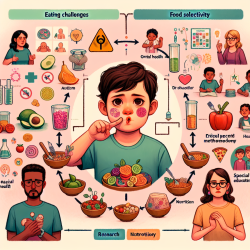Introduction
In the evolving landscape of health research, the inclusion of youth perspectives is not just beneficial but essential. The research article "Benefits, barriers and recommendations for youth engagement in health research: combining evidence-based and youth perspectives" underscores the importance of involving young people in health research to enhance outcomes and ensure that interventions are relevant and effective. This blog post aims to provide insights for practitioners on how to improve their skills by implementing the findings of this research or by encouraging further exploration into youth engagement.
Understanding Youth Engagement
Youth engagement in health research refers to the active collaboration between researchers and young individuals, typically aged 15 to 24. This partnership is crucial for developing interventions that are not only effective but also resonate with the youth's unique needs and experiences. The research highlights various forms of youth engagement, including participation as research subjects, advisors, partners, and even co-investigators.
Barriers to Effective Engagement
Despite its benefits, youth engagement in research faces several barriers. These include:
- Youth-Related Barriers: Time constraints, lack of understanding of research processes, and mistrust towards healthcare systems.
- Researcher-Related Barriers: Attitudes towards youth involvement and a lack of skills to engage effectively with young people.
- Organizational Barriers: Insufficient infrastructure and resources to support youth engagement.
- System-Level Barriers: Systemic discrimination and exclusion from research opportunities.
Recommendations for Meaningful Engagement
The research provides several recommendations to overcome these barriers and foster meaningful youth engagement:
- Flexible Communication: Use diverse communication methods to accommodate different needs and preferences.
- Mentorship Opportunities: Provide mentorship to help youth understand their roles and the benefits of their involvement.
- Diverse Recruitment: Ensure recruitment strategies are inclusive and representative of the youth population.
- Understanding Commitments: Clearly outline the commitments and benefits involved in participating in research.
Implementing the Findings
For practitioners looking to enhance their skills in youth engagement, the research suggests creating an inclusive environment that fosters trust and collaboration. This involves training researchers on effective communication strategies, developing policies that support youth engagement, and ensuring that youth voices are not only heard but valued.
Encouraging Further Research
The research also calls for further exploration into the dynamics of power-sharing between researchers and youth, as well as the development of youth-specific evaluation frameworks. Practitioners are encouraged to delve deeper into these areas to enhance the impact of youth engagement in health research.
To read the original research paper, please follow this link: Benefits, barriers and recommendations for youth engagement in health research: combining evidence-based and youth perspectives.










